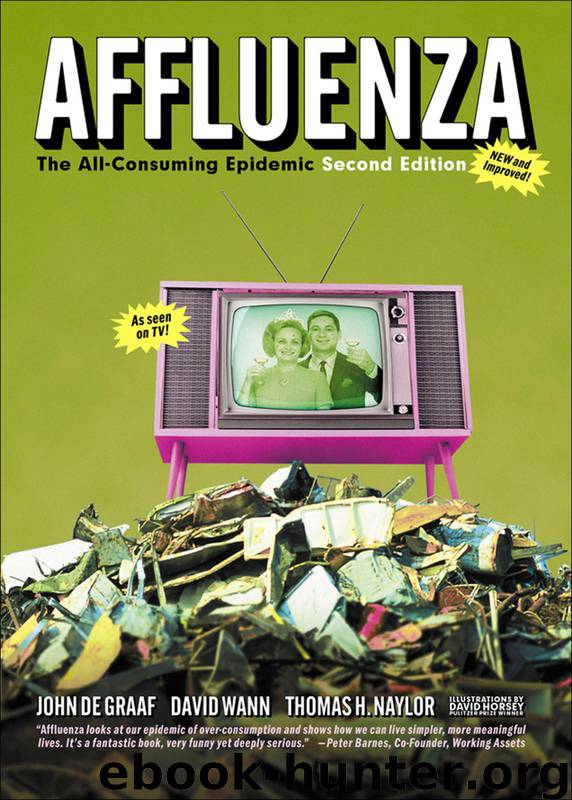Affluenza: The All-Consuming Epidemic by John de Graaf; David Wann; Thomas H Naylor; David Horsey; Vicki Robin

Author:John de Graaf; David Wann; Thomas H Naylor; David Horsey; Vicki Robin
Language: eng
Format: mobi
Tags: Quality of Life - United States, Consumption (Economics), United States - Civilization - 1970, Quality of Life, United States, United States - Economic Conditions - 1981, Consumption (Economics) - United States
ISBN: 9781576753576
Publisher: Berrett-Koehler Publishers
Published: 2001-01-01T23:00:00+00:00
WEALTH AS DISPOSABLE TIME
Neither would “an enforced equality of wages,” made law by a socialist government, lead to happiness, which, Marx believed, was to be found instead in our relationships with other people and in the development of our capacities for creative expression. “The wealthy man,” he wrote, “is one who needs a complex of human manifestations of life and whose own self-realization exists as an inner necessity.” He suggested that “too many useful goods create too many useless people.”11
Of course, Marx understood that human beings must have enough wholesome food, decent shelter, and protective clothing. Mass production, he believed, made it possible for everyone to achieve these ends. And to do so each person would have to perform a certain minimum amount of repetitive, noncreative labor. Marx called this time, which he and Engels estimated could be reduced (even in the mid-1800s) to as little as four hours a day, “the realm of necessity.”
The work time necessary to satisfy real material needs could be reduced further by increases in productivity, “but it always remains a realm of necessity. Beyond it begins that development of human power, which is its own end, the true realm of freedom,” when self-chosen activity prevails. Of this realm of freedom, Marx added, “the shortening of the working day is its basic prerequisite.”
“A nation is really rich if the working day is six hours rather than twelve,” Marx wrote, quoting approvingly the anonymous author of a British article written in 1821: “Wealth is liberty—liberty to seek recreation, liberty to enjoy life, liberty to improve the mind: it is disposable time and nothing more.”12
Download
This site does not store any files on its server. We only index and link to content provided by other sites. Please contact the content providers to delete copyright contents if any and email us, we'll remove relevant links or contents immediately.
| Elections & Political Process | Ideologies & Doctrines |
| International & World Politics | Political Science |
| Public Affairs & Policy | Specific Topics |
| United States |
The Secret History by Donna Tartt(16704)
The Social Justice Warrior Handbook by Lisa De Pasquale(11501)
Thirteen Reasons Why by Jay Asher(7823)
This Is How You Lose Her by Junot Diaz(5817)
Weapons of Math Destruction by Cathy O'Neil(5068)
Zero to One by Peter Thiel(4858)
The Myth of the Strong Leader by Archie Brown(4805)
Promise Me, Dad by Joe Biden(4467)
Beartown by Fredrik Backman(4457)
How Democracies Die by Steven Levitsky & Daniel Ziblatt(4438)
Stone's Rules by Roger Stone(4433)
The Fire Next Time by James Baldwin(4362)
100 Deadly Skills by Clint Emerson(4102)
A Higher Loyalty: Truth, Lies, and Leadership by James Comey(4050)
Rise and Kill First by Ronen Bergman(4036)
The David Icke Guide to the Global Conspiracy (and how to end it) by David Icke(3907)
The Farm by Tom Rob Smith(3889)
Secrecy World by Jake Bernstein(3800)
The Doomsday Machine by Daniel Ellsberg(3747)
